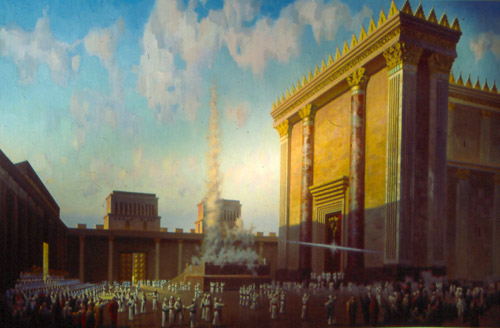Tisha B’Av – observed by Jews in Israel and all around the world – is the day of national mourning. It marks, among other major tragedies in Jewish history, the destruction of the First and Second Temples and the beginning of the Jewish exile. According to Jewish tradition, with the coming of the Messiah, the Temple will be rebuilt and there will be peace on earth.
On this note, the Temple Institute – a non-profit educational and religious organization located in the Jewish quarter of Jerusalem’s Old City – has launched a global campaign for the rebuilding of the Temple. This is how to bring true peace to all mankind, says Rabbi Chaim Richman, the Institute’s international director.
“First and foremost, there is the mitzvah (commandment) of building the Temple for the entire nation,” Rabbi Richman told United with Israel during an interview at his Jerusalem office. “The function of the Temple Institute is to awaken the hearts and to serve as a think tank as much as we can on a scholarly level.”
The Institute has been preparing essential vessels for many years, but there are other areas of focus as well, he said.
“Just like any building project of such a scope, you need proper plans. For the Holy Temple, that’s very expensive.”
What is even more important than the money, he said, is providing an opportunity to people to participate in the building of the Temple according to each person’s ability.
“We have actually completed the blueprint for one area of the Temple – the Chamber of Hewn Stone, which is the chamber of the Sanhedrin (rabbinical court).”
With Tisha B’Av only five days away at the time of the interview,
Rabbi Richman discussed the significance of the day, “a time when the Jewish People is unified and focused on the destruction of the Temple and when the entire nation becomes a mourner.”
How Do We Stop Mourning the Temple?
Indeed, Jews are in mourning for three weeks, culminating in Tisha B’Av.
However, “how do we ensure that we do not mourn forever? The purpose of the Jewish People is not to be mourners, but to be builders and to be a light unto the nations.”
This project is “a very natural response to this period of time – to be motivated in the midst of our mourning to change the situation,” the rabbi stated, adding that he sees many links to the war with Hamas taking place during this three-week period.
‘The Temple Mount is Under Hamas’
“The simplest connection,” he said, is that the IDF is going all the way into Gaza to capture the “terrorists wanting to kill us, but the Temple Mount is under Hamas. They are flying flags over the Temple Mount…. Mobs of tens of thousands of Arabs rioted there a few days ago.”
Although the site is officially under the administration of the Jordanian Waqf (Islamic Trust), people who attack Jews on the Mount receive monthly salaries from Hamas, Rabbi Richman asserted.
“This is no metaphor. On the simplest level: We are going into Gaza, but they’re in our backyard. And it’s God’s front yard.”
“On a deeper level, he continued, “we are fighting a war of existential survival,” pointing to the IDF’s discovery, during the current war, of Hamas’s plan for thousands of terrorists to invade Israel through dozens of tunnels on the coming Jewish New Year – a plan that was thwarted by the Israeli military.
Difference between Surviving and Flourishing
“But there is a difference between surviving and flourishing,” Rabbi Richman said. “Flourishing means bringing back God’s presence” and making the Holy Temple a place of prayer for all nations, according to the prophecy of Isaiah.
“We are surrounded by hostile Arabs. Are we going to be in it forever, or are we going to bring about the Redemption for all mankind?”
According to Rabbi Richman, the fact that “we’re in this specifically now is so divinely orchestrated. I believe this is like a Tikun (rectification). God wants us to honor him and to be Jews. The fact that these monsters want to kill us is a chilul Hashem – a desecration of God’s name. We have to show that we are not like that.
“So what is really going on right now? The whole world is speaking vilely about the nation of Israel. This is our Tikun – the Tikun of moving and building, of doing something about it.”
Equal Rights for All Humanity, Not Only Jews
Not only Jews, but all non-Moslems are denied equal rights at the Temple Mount, according to the status quo, Rabbi Richman said.
“The Temple Mount is not about civil rights for the Jewish people. It is about equal rights for all humanity to pray at the holiest place,” he declared, noting that in the days of King Solomon, the kings and queens of all nations were free to worship there.
“But a Jew can’t even move his lips in prayer now,” he said, acknowledging that fighting for equal rights is “an important first step.”
A ‘Spiritual Revolution’
“But what we’re talking about here is a spiritual revolution, and in that the Temple plays a very key role. I think this subject is becoming more mainstream than ever before.”
Several Members of Knesset (Israeli Parliament) have been advocating for Jewish prayer on the Temple Mount, he pointed out.
The very fact that a dozen or so lawmakers have been so outspoken about this issue, in Rabbi Richman’s view, testifies to the accomplishments of the Temple Institute over the past 25 years.
“Years ago, you would not be able to talk about it,” he said. “You would be laughed at. You would never make it to the Knesset.
“This is a very blessed development. It shows a paradigm shift in the consciousness of the nation.”
By Atara Beck
Senior Writer/Editor, United with Israel
